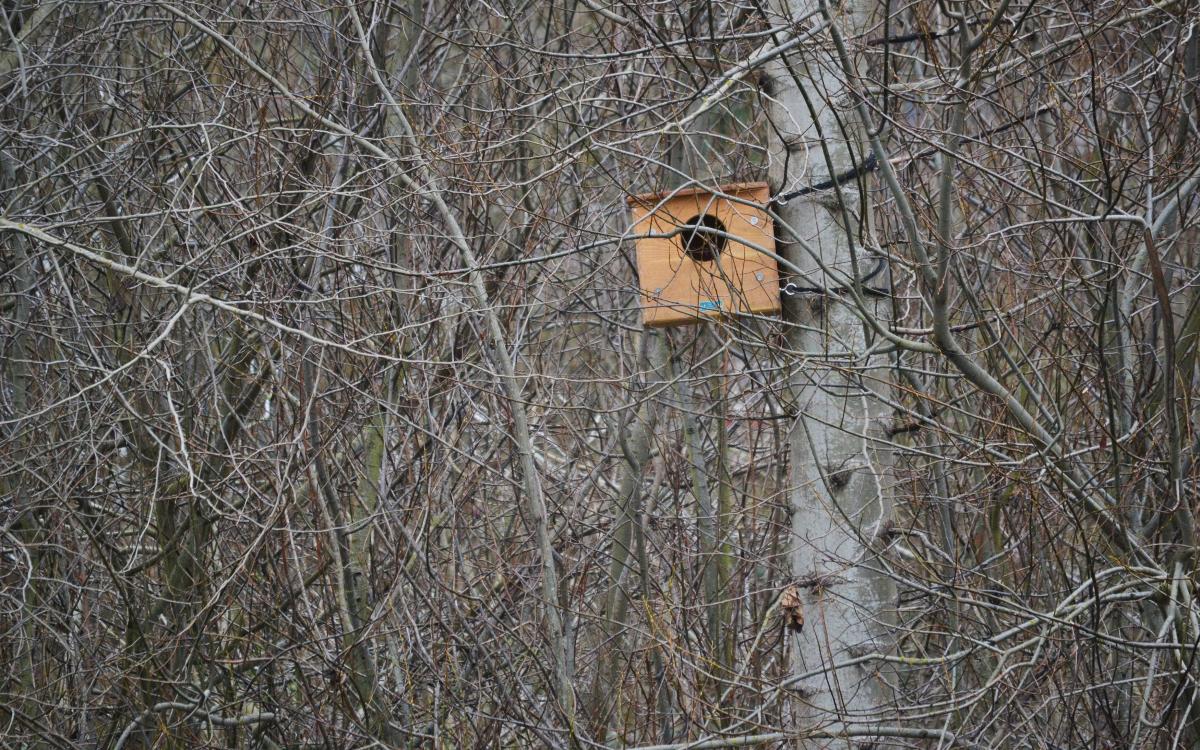At a glance
Our goal is to incorporate several owl nesting boxes on conifer trees located near Denny Field, William H. Gates Law… Read full summary
- Funding received
- 2010-2011
- Mini
- Awarded
- $1,000
- Funding partners
-
- Services and Activities Fee (SAF)
Our goal is to incorporate several owl nesting boxes on conifer trees located near Denny Field, William H. Gates Law Library, and the Union Bay Natural Area. Through a physical survey of campus, we found specific trees in these areas that meet the necessary criteria for barn owl habitat. The boxes will be anchored to the trees using rings that will wrap around the circumference of the trunk, and can be loosened periodically to accommodate the growth of the tree. It is our hope that within two years, one or more barn owls will encounter these boxes and take up residence on campus. We chose barn owls because they are commonly found in the Pacific Northwest, provide natural pest control, can easily live in human-modified environments, and they are a dynamic “charismatic mega-fauna” that will add complexity to biodiversity at UW. According to our panel of experts Kristine Kenny of the UW Landscape and Architecture, Heather Swift of Cohabitats, and Charles Easterberg of the UW Sanitarian, we would have a better chance of attracting an owl if we put up more than just four boxes. To get a head start and increase our chances, we would like to put up ten boxes.
Define the campus environmental problem that you are attempting to solve:
We are attempting to expand diversity on campus through the implementation of barn owl boxes around campus. Many urban sites have lost species such as barn owls due to loss of habitat and construction. Today we see a strong push for habitat to be brought back to these urban areas. At the University of Washington we have many acceptable areas for barn owls to nest and forage. This project was developed in Justin Hellier's class and would be a fantastic example of sustainability projects extending past the classroom and into action.
Describe your proposed solution to this problem:
We propose the incorporation of several owl nesting boxes on conifer trees located near Denny Field, William H. Gates Law Library, and the Union Bay Natural Area. Through a physical survey of campus, we found specific trees in these areas that meet the necessary criteria for barn owl habitat. The boxes will be anchored to the trees using rings that will wrap around the circumference of the trunk, and can be loosened periodically to accommodate the growth of the tree. It is our hope that within two years, one or more barn owls will encounter these boxes and take up residence on campus. We chose barn owls because they are commonly found in the Pacific Northwest, provide natural pest control, can easily live in human-modified environments, and they are a dynamic “charismatic mega-fauna” that will add complexity to biodiversity at UW.
What form and amount of student leadership will your project involve?
Because the owl boxes require maintenance, the majority of student leadership will come from the students involved in executing the project. We will require knowledgeable student volunteers to aid in the construction and placement of the boxes. We will also be coordinating with the Burke Natural History Museum student committee to arrange for the required annual cleaning of each box.
What type and amount of outreach and education will your project involve?
We believe this project has the potential to provide numerous educational opportunities to the UW community. With involvement through the Burke Museum Student Committee, and outreach to multiple classes we would like to think that UW students will become involved. Making the boxes known will include an article in the UW Daily, and by contacting environmental RSOs on campus to tell their members about the project. This project was also conceived in Sustainability Studio, an upper level environmental class that focuses on making our campus more sustainable. It would be a fantastic opportunity for the class to have a real life project come out of it.
What amount of funds do you anticipate your project will require from the CSF?
We anticipate that this project will be fairly inexpensive relative to the benefits it will provide to the University of Washington. We are asking for an initial grant of $2,000 for the construction and placement of three-four boxes, including the first two years of upkeep and cleaning. We plan on keeping track of the boxes throughout the rest of our time at college, and will work hard to pass the project on before we go.
Jessica Kang
Project lead
- tsmaniac@uw.edu
- Affiliation
- Student
- Affiliated groups
- Registered Student Organization (RSO)
Alex Ulmke
Team member
- aulmke@uw.edu
- Affiliation
- Student
- Affiliated groups
- Registered Student Organization (RSO)
